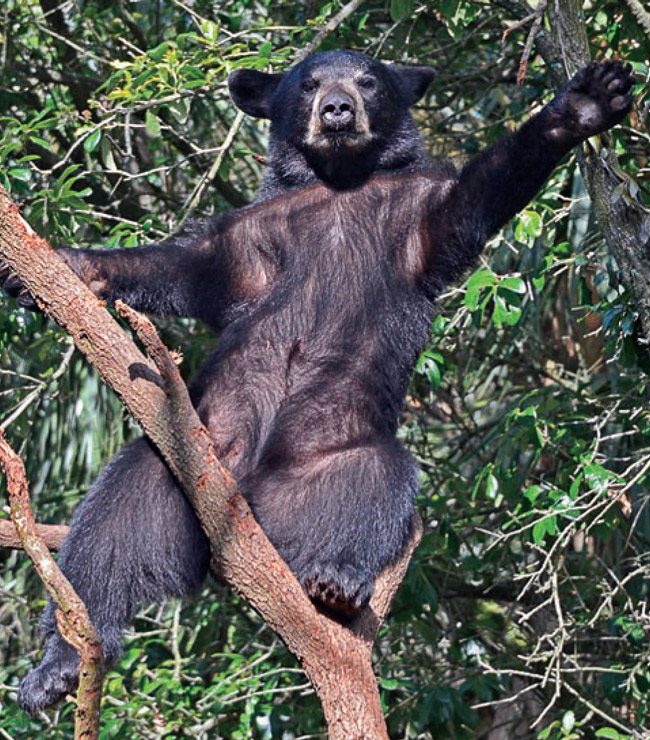
Worried about bears in your neighborhood? Interested in learning the best ways to handle a bear encounter, or to prevent one? Natalae Almeter of the Florida Fish and Wildlife Conservation Commission will host a presentation on the topic Thursday evening at 6 p.m. at Palm Coast’s City Hall, in the Community Wing. It’s open and free to the public.
Almeter, a member of FWC’s Florida Black Bear Management Program, says the educational effort is a response to an increase in bear sightings locally. “We want keep bears wild and make all of Palm Coast BearWise,” Almeter said, “especially since we’re about to head into the busy bear season. Bears will soon be active up to 18 hours a day and may increase their daily caloric intake from 5,000 to 20,000 calories.”
FWC issued a “Guide to Living in Bear Country” brochure that outlines the variety of bear experiences–and responses–possible. FWC estmates that there are some 4,350 black bears in the state, up from about 300 in the 1070s, despite the recent hunt of black bears that FWC authorized in 2015. No such hunt is expected so far this year.
Bears that pose dangers to human habitats can be killed rather than relocated by state authorities. “Unfortunately,” the brochure states, “relocation typically does not resolve human-bear conflicts. In Florida, it is rare to find public lands large and remote enough where bears can be moved without coming in contact with people. Relocated bears typically leave the new area to return to their original home or because the new habitat is already occupied by other bears. The result can be bears wandering through unfamiliar areas and crossing busy roads, which creates a danger to motorists and
bears. In addition, relocated bears very often exhibit the same unwanted behavior they did before, so relocation may just shift the problem to a new place. For all these reasons, relocation is neither a desirable nor effective way to solve human-bear conflicts.”
But it is possible to discourage bears from rummaging in in new, unfamiliar terrain.
Another brochure–“Is your yard a restaurant for bears?”–suggests pragmatic tips on securing backyards.
The efforts that you take to make your yard less attractive to bears are important for the safety of pets, children and adults, the FWC brochure notes. Yet these same efforts also help conserve the lives of bears. Once you prevent bears from getting access to human sources of food, they are likely to stop coming into your neighborhood. That will help reduce human-bear conflicts. The bonus for you is those same steps also should keep foxes, coyotes, raccoons, rats and opossums from wandering into your yard in search of food as well.
So here are key “bear wise” tips to apply in your yard, whether you live in town or the country:
• Secure garbage in bear-resistant cans or in places such as a closed garage or sturdy shed. Wait until the morning of your garbage pickup day to bring trash cans to the curb.
• Feed pets indoors, or bring their outside food dishes in at night, even if they are empty. Store pet or livestock feed in bear-resistant containers.
• Remove bird and wildlife feeders. Ensure outdoors areas are free of all seed, corn and other wild animal feed.
• Keep gardens and orchards tidy. Harvest nuts, fruits and vegetables when they are ripe. Remove rotten fruit or vegetables.
• Clean barbeque grills and meat smokers after use with a degreasing detergent.
• Use electric fences to protect livestock, beehives, gardens and compost piles.
A critical conservation issue for Florida black bears is the increase in human-bear conflicts, which has been accelerated by the growing number of both bears and people in the state. There has been an increase in human-bear encounters and incidents of bears getting into garbage because people were not keeping their trash secure. In 2015, there were more than 6,000 calls to the Florida Fish and Wildlife Conservation Commission (FWC) about bears, with 30 percent of the calls related to bears in garbage. See the full brochure here, and see below.
![]()
Click to access You-Live-in-Bear-Country-and-Securing-Attractants-Double-Sided_NE.pdf





























ELIZABETH says
If this person or persons know so much about wild bears then they would know that if they relocate bears to another area if that area is already territory to another. Also, there is not a large enought area to relocate bears because all we do is continue to building homes and mini malls when we can’t even rent the space out for the many that are vacant. They were here first. Live with it or move!
daveT says
Maybe we need to start relocating the people. The bears were here first.
Old Lady says
The bears were here first
t says
Best way to stop bears coming in residential is for people to stop cutting down there home for money
Anonymous says
I don’t care if bears are here first…..my shotgun is here now….
szglassy says
Best thing to do is to not leave food sources out.Follow these rules and the bears will move on.
YankeeExPat says
The root cause for Bear encounters outside of their natural habitat is always the same, some Nimrod who decides it’s a cute idea to feed the Bears. Like the Old adage about the Bears and the Pope, they belong in the woods ………the Bears that is! ……jeessh!
Thomas Conrad says
Well said Yankee.